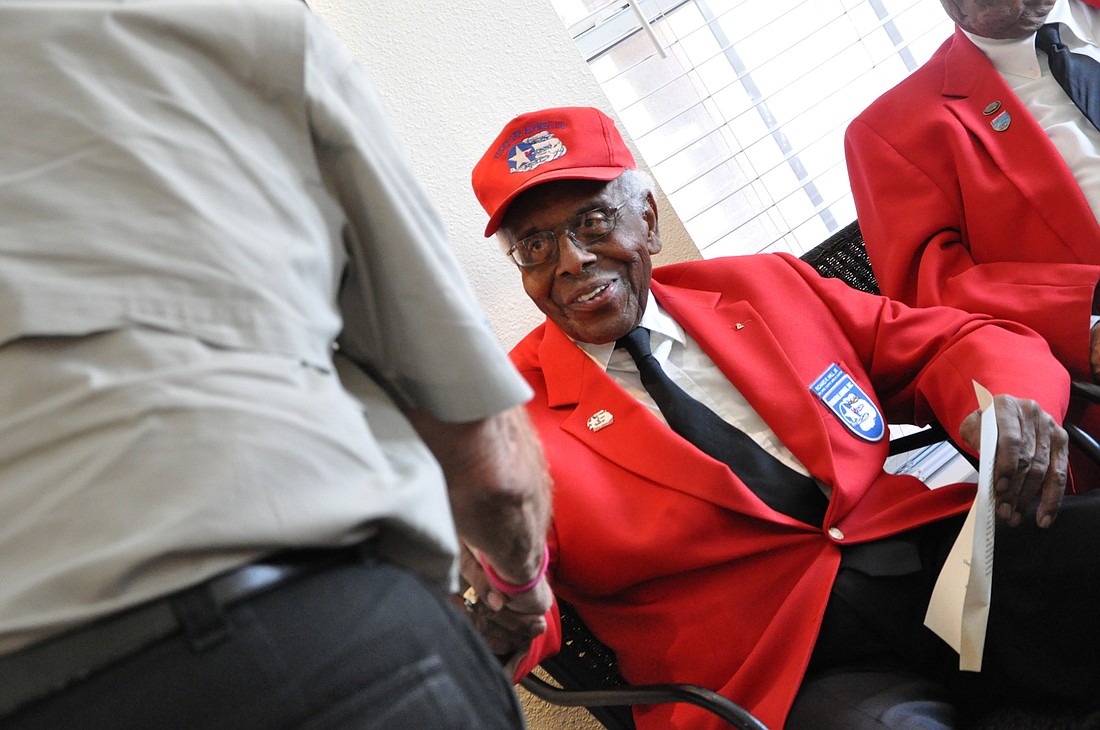- July 26, 2024
-
-
Loading

Loading

Richard Hall Jr. was fighting not one but two wars when he was drafted by the U.S. Army Air Force in 1942.
From the cockpit of his P-51 Mustang and on the ground as a flight engineer, he battled the Nazi war machine many miles away from home.
But Hall also faced another enemy: racial prejudice and segregation within America’s military.
Hall, who grew up in Winter Park, is one of about 996 African-American pilots and 15,000 ground personnel who served in the U.S. Air Force’s all-black units during World War II — the first in the nation’s history and known as the Tuskegee Airmen.
Hall, 93, was honored for his service by Cornerstone Hospice & Palliative Care at a ceremonial salute leading up to Veterans Day Saturday, Nov. 4, at the Hannibal Heritage Center. There, he received an American flag pin and a salute from numerous veterans.
“These guys are living history,” U.S. Marines veteran Cpl. George Wanberg said. “There’s not too many left. To be able to honor a group of people that have gone through what they went through and were ostracized when they were in the military … they were such heroes.”
Hall has been thanked countless times for his mark on American history, from the Congressional Gold Medal he received from President George W. Bush in Washington, D.C., to the life-sized sculpture in his likeness that sits outside the Hannibal Heritage Center, forever sporting a red Tuskegee Airmen hat and jacket.
It still feels nice to be recognized, Hall said.
“It’s very special,” he said. “People say a lot of nice things about you.”
The Tuskegee Airman has deep roots in Winter Park area and still lives here today. His family moved in 1924 from Georgia, when Hall was only 6 months old. He went to high school at Robert Hungerford Boarding School in Eatonville.
RED TAIL TALES
Hall still remembers the day he got his draft letter in 1942 at age 18. He was attending Xavier University at the time in New Orleans and had joined the Army Air Force Reserves to remain in college.
He would have to fight anyway though: He received orders to report for active duty immediately. World War II was well underway.
“I just wanted to get home safe with all my limbs,” Hall said. “You see guys coming back blind, no legs, no arms. Other guys lost their minds, but I still had my right mind.”
The “Red Tails,” as they were known because of the red tails on their planes, were the first African-American aviators in the United States military. Hall and the other brave soldiers reported to Tuskegee, Alabama, to receive their training. From there Hall joined the 332nd Fighter Group and the 477th Composite Group, which included the 99th Fighter Squadron and the 617th Bomber Squadron.
According to Valencia College professor and U.S. Army veteran Capt. John Creighton, the Tuskegee Airmen accounted for more than 15,000 combat stories, 111 German airplanes destroyed in the air and another 150 on the ground, 950 railcars and vehicles destroyed, and a destroyer battleship sunk.
Sixty-six pilots were killed in action, and 32 pilots were downed and captured. The Tuskegee Airmen were awarded 744 Air Medals, 150 Distinguished Flying Crosses, 14 Bronze Stars and eight Purple Hearts.
It was the brave actions and perseverance of these African Americans during a time of racial prejudice that led to the desegregation of the military in 1948 under President Harry S. Truman. That allowed future Tuskegee Airman and Lake City resident John M. Gay to join the ranks of the military just three months later — he was honored and saluted at Saturday’s event as well.
Hall served his country over a span of three decades across four continents, working his way up to the rank of chief master sergeant.
When looking back at the black-and-white war photographs and the legacy the Tuskegee Airmen have left behind, Hall is just glad he was able to make a difference — even if it meant fighting two wars at once, he said.
“I’m glad I was able to do something,” Hall said.